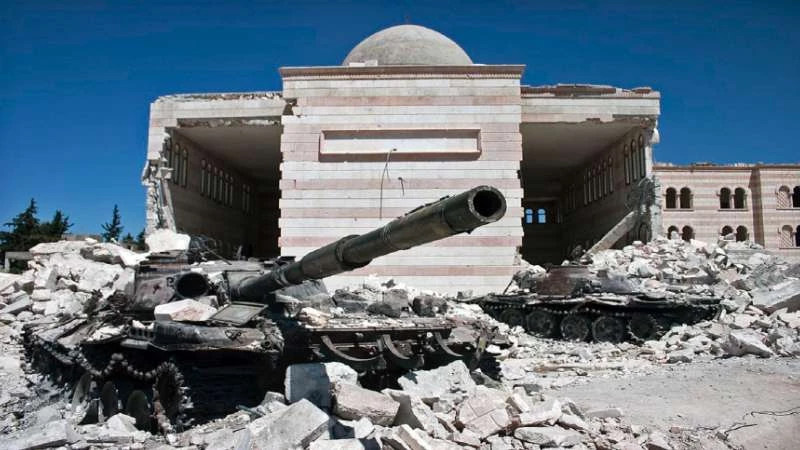But the war still smolders, and the White House will, sooner or later, have to reckon with its complexity. It may also need to confront the mounting evidence of atrocities committed by the regime of Bashar al-Assad.
On Monday, Human Rights Watch issued a report on the regime’s alleged use of chlorine bombs during its successful campaign last year to reclaim the last rebel-held territory in the city of Aleppo. The rights group documented at least eight separate chlorine gas attacks before a cease-fire was signed on Dec. 13. "The attacks resulted in the deaths of nine civilians, including four children, and wounded roughly 200," reported my colleague Thomas Gibbons-Neff. "If confirmed, the attacks would be a significant breach of the 1993 Chemical Weapons Convention that Syria signed in 2013."
That year, the Obama administration almost went to war against the Assad regime for its alleged role in a sarin gas attack that killed hundreds of civilians. The U.S. ultimately chose not to launch punitive air strikes, in part because of a deal brokered by Moscow that saw Syria sign on to the convention and pledge to give up its chemical weapons stockpiles. Nevertheless, chemical attacks seem to have continued, and even insurgent groups like the Islamic State have deployed munitions from their own illicit stores.
A separate report released on Monday by the Atlantic Council, entitled "Breaking Aleppo," also confirmed the use of chemical weapons, as well as the regime’s widespread and deliberate targeting of civilian areas in the city, including hospitals, schools and bakeries. Its analysis was based on an exhaustive study of satellite imagery, eyewitness accounts and surveillance footage. The report rebuked both the Russian government, which assisted the regime’s aerial bombing campaign, and Iran, whose proxy militias fought on the ground alongside Assad’s forces.
"The biggest revelation of this report is not necessarily that these attacks were happening, but the scale at which they were happening," said Eliot Higgins, a senior fellow at the Digital Forensic Research Lab of the Atlantic Council, to CNN.
Perhaps the most grisly revelations came last week in an Amnesty International report, which alleged the regime carried out a campaign of mass executions between 2011 and 2015, hanging as many as 13,000 suspected dissidents in that time.
Assad, though, laughed off these claims in an interview with Yahoo News on Friday. He also darkly warned that some people among the roughly 5 million Syrian refugees now languishing outside their homeland were actually "terrorists." Assad frames the war as a battle pitting his government against those "terrorists," sinister jihadist forces propped up by shadowy foreign powers. He and his supporters extol the success of small-scale ceasefires and "reconciliation" measures in various towns and neighborhoods once controlled by rebels.
The irony is that the Assad narrative seems welcome in the Trump White House, which has made clear it’s not interested in fomenting regime change in Syria and simply wants to tackle the threat of the Islamic State.
The White House’s main solution for Syria’s humanitarian calamity — beyond shutting the door to refugees — would be the creation of safe zones in the north of the country, something politicians as disparate as Hillary Clinton and Turkish President Recep Tayyip Erdogan have suggested before. But Trump officials have been largely silent on how they would achieve this goal. Experts point out that such an intervention would itself be provocative and likely opposed by the regime and its ally, Russia, in the U.N. Security Council. Even then, the safe zones may not be that safe.
"The objective of this kind of project may be described as fundamentally humanitarian, but the reality is that any number of parties, starting with the Assad regime and the Islamic State, are going to see it as a threat, and that’s going to make it a target instead of a safe place,” said Daniel Byman, a professor of security studies at Georgetown University, to the Christian Science Monitor.
Russia, Iran and Turkey are now steering the slow-moving Syrian peace process forward. A new round of talks is expected to take place later this week in the Kazakh capital of Astana, with the U.S. taking a back seat. That Ankara and Moscow — once on opposite sides of the conflict — are now tightening cooperation underscores the increasing irrelevance of the United States to the Syrian endgame.
"In the aftermath of Aleppo’s destruction, the Trump Administration inherits a U.S. position that is weaker than ever, in an even more shattered Syria," concludes the Atlantic Council report. But it’s not clear yet whether the Trump administration has much desire to improve that position.
Ishaan Tharoor (The Washington Post)



التعليقات (0)